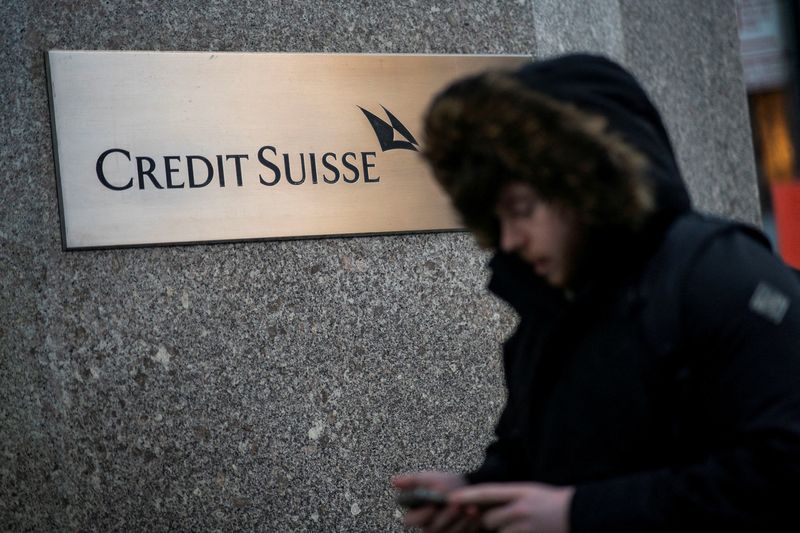NEW YORK (Reuters) -On March 16, 2008, Bear Stearns was forced into the arms of JPMorgan Chase & Co (NYSE:JPM) in a dramatic weekend rescue after Wall Street turned on the investment bank, fearing it would collapse.
Fifteen years later, Credit Suisse Group AG found itself on a similar precipice. The Swiss lender, weakened by a series of scandals, had seen its already-low share price fall even further after the failure in recent days of two U.S. banks, SVB Financial Group and Signature Bank (NASDAQ:SBNY).
So, when Saudi National Bank Chairman Ammar Al Khudairy said his bank, the largest investor in Credit Suisse, could not give it more money, investors ran for the exits.
It didn't matter that Saudi National Bank also gave a reason - further investment would leave it with more than 10% of Credit Suisse's shares, a regulatory hurdle - and that it said it was happy with the Swiss bank's turnaround plan.
Nor did it matter that Credit Suisse Chief Executive Ulrich Koerner had been out over the past few days trying to reassure investors that the bank was strong, with enough capital and liquidity.
By the time traders in New York were switching on screens on Wednesday, Credit Suisse had lost more than a fifth of its value. Its five-year credit default swaps, an indicator of credit stress, spiked to a new record high.
The Swiss lender, investors saw, was not only much bigger than the regional U.S. banks that had failed in the past few days, but it was also an important cog in global financial plumbing and deemed sysemically important. They worried its problems could ripple through global markets in unexpected and devastating ways.
Regulators watched the stock fall with concern while rivals and clients scanned their books to see what exposure they had to the bank, according to interviews with multiple industry sources and statements from regulators. Some urged their counterparts in Switzerland to act quickly to save the bank.
"The thing that's keeping markets on their toes is we had SVB, then Signature Bank closing down; now it's Credit Suisse," said Robert Carnell, ING's head of research for Asia Pacific. "What next?"
Credit Suisse did not comment for this story but noted recent interviews given by its CEO saying the bank was strong.
As the day progressed on Wednesday, a crisis of confidence enveloped Switzerland's second-biggest bank.
An asset management company in New York was assessing its trading risk, examining what open positions it had with Credit Suisse, said a source at the company.
At a rival bank, an executive reported seeing more Credit Suisse deposits flowing in.
Credit Suisse's bankers were fielding queries from corporate clients who were checking on their liquidity positions with the Swiss bank, two banking sources said.
Large corporate clients had calls and meetings with bankers to assess and understand the evolving situation with the bank and the sector in a so-called "welfare check", the sources said.
Staff struggled on through the drama.
"People are nervous, but everyone is still doing their job," said one source familiar with the matter.
PRESSURE INCREASES
Not all clients said they were concerned. A corporate treasury executive at a major U.S. firm with hedging business with Credit Suisse reported feeling comfortable with the bank despite what was going on.
A top U.S. bank also kept dealing with Credit Suisse as a counterparty but was carefully managing its exposure, which was small, according to a source.
Bankers were more concerned about contagion or unexpected effects of the Swiss lender's troubles that were not yet understood, one banking source said.
Pressure intensified on the bank. A major European bank held talks with Credit Suisse, urging the lender to seek an urgent central bank liquidity backstop, according to a source with knowledge of the discussions.
By late afternoon in New York, there was relief. Swiss regulators had thrown Credit Suisse a financial lifeline.
STILL SMOLDERING
Markets seemed to calm, but the fresh drama around Credit Suisse jogged memories that the financial system was not out of the woods yet.
"The response was good. It stopped the sort of immediate burning fire, but I don't get the feeling the whole fire is out," said one banking lawyer, referring to the Swiss backstop. "It's smoldering."
Late on Wednesday, as the trading day swung to Asia, Credit Suisse came out with its own new plan, to "strengthen its liquidity" with debt and cash offers.
"We welcome the statement of support," Credit Suisse said.
